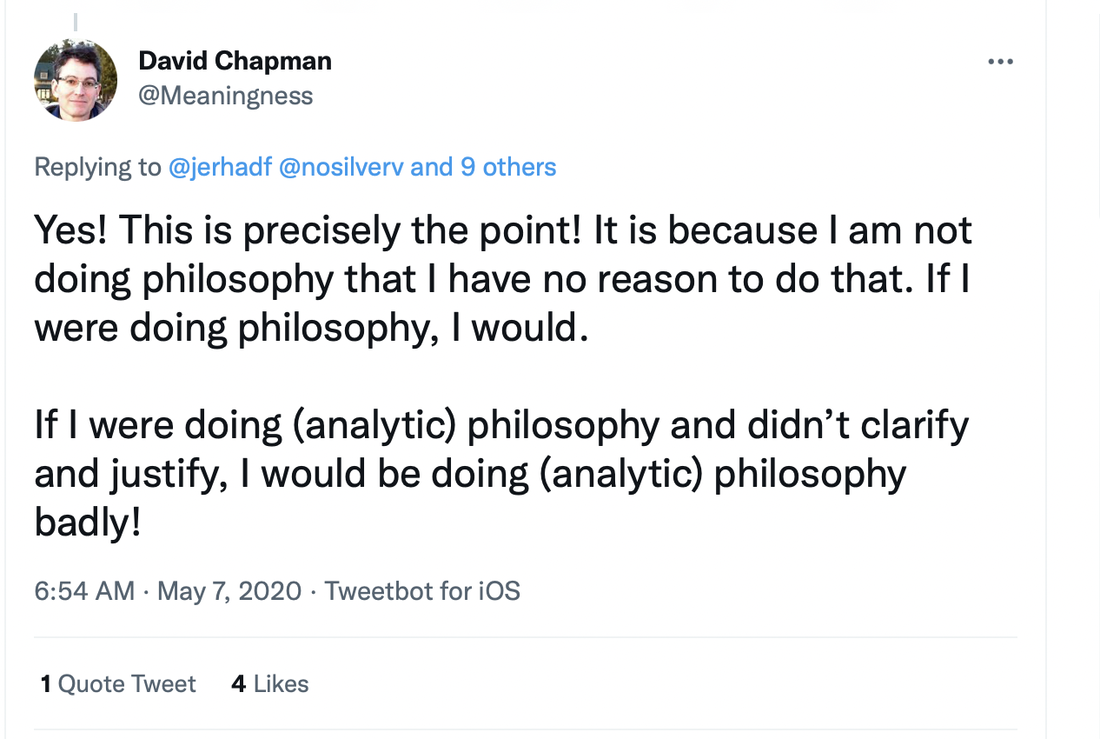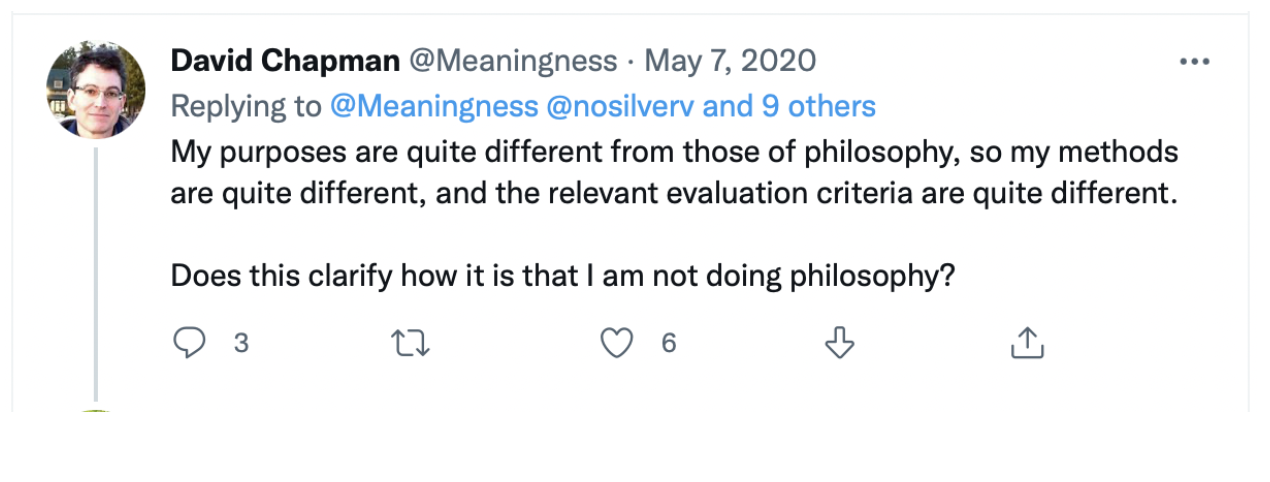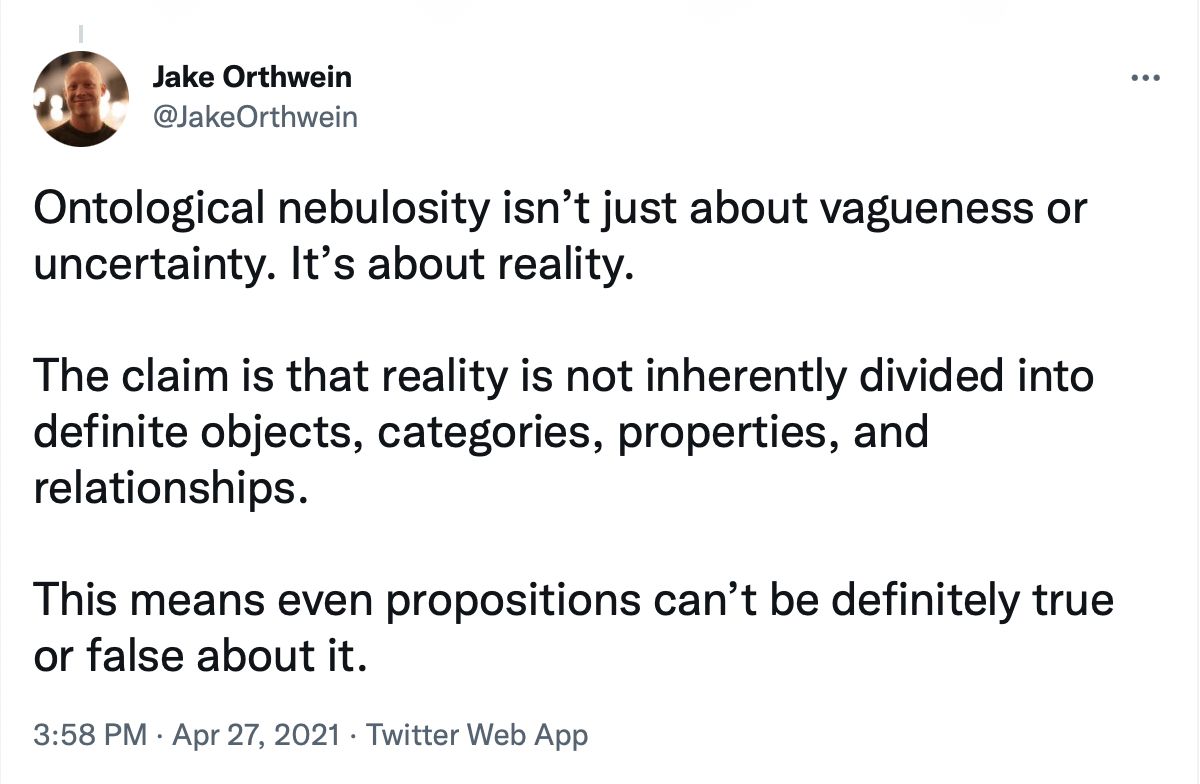|
Some time ago I responded substantively to the content here: https://meaningness.com/ via a podcast-type bit of audio that can be found here: soundcloud.com/brett-hall-653181617/what-is-this-thing-called-cr What follows is a supplement to that motivated by some further tweets that came across my feed. Hence it seems to be worth emphasising the following if they were not clear from that audio: “CR” is just an account of how knowledge is created. It is not an ontology. Realism is not a hugely substantive ontology either - it’s little more than the stance “reality exists” and CR says both “it’s knowable” (in the Popperian sense) and we can be wrong about it (which is “fallibilism” by another route and merely underscores what “in the Popperians sense” is getting at with knowledge and our relationship to it). a Unlike with what is stated here https://meaningness.com/resolution and here https://meaningness.com/nebulosity and at the links one follows from those pages about “meaningness” and “nebulosity”, CR, fallibilism and realism are silent on *ontology* in a way “meaningless” and “nebulosity” are not. The epistemology Popper and Deutsch among others - what we simply call “epistemology” (along with science & everything else) allow us to create knowledge about reality but are silent on what reality “really” is (which is to say “ontology”). In other words what that reality is *ultimately* like (the ontology) is not knowable by fallible means - by any epistemological, philosophical, scientific or other methodology. And these (and related domains like mathematics, introspection and so on), broadly speaking, are all we have and the only means by which we imperfectly access reality - never directly - only through our knowledge - our interpretations of our theories which are themselves interpretations of that underlying reality which exists but in what form precisely we cannot say. So it seems “ontology is nebulous” or meaning is, and so forth are far stronger claims than anything in CR, the work or Popper, Deutsch or other kinds of “vanilla realism” so to speak. Because we cannot utter perfect truth (which would require us speaking in perfect propositions - an impossibility) we cannot make claims about ultimate reality rather only claims about reality as it is known. So we stay silent on final reality aside from the rather prosaic claim that it - reality - exists and we can know it imperfectly. Beyond that there are only faith claims and *no problem is solved* by conjecturing what final reality is like in any sense. So, instead, we just do science, mathematics and philosophy and create fallible explanations which are imperfect but somewhat accurate (they are not utterly false) accounts of what is out there and how it works. But whether reality is made up of “discrete” or “continuous” quantities, or only one of those, or some combination of those, a “third option” which is neither of those at all and entirely separate to them, whether is be something “nebulous” or something physical, abstract, physical and abstract or something stranger than all of these realism does not say. It - realism - merely says reality is knowable imperfectly. I raise all this only to highlight how far divorced from dogmatic claims, superstitious claims or faith claims this philosophy descended from Popper (and, say, Xenophanes) is. We only admit of what we know (in the Popperian sense as fallible conjectures) and remain silent on either statements or propositions about (ultimate) reality. Not because we know that reality is or is not nebulous or that it is in reality nebulous or not but rather because no such claim can be made. What we know instead is reality in terms (and via) of science, reason, philosophy, morality - explanations as a whole. What we understand at any given time are theories of reality - not reality itself. So we understand general relativity that describes a continuous spacetime and a (quantum) physics that in part describes discrete quantities and physical “stuff” as well as a continuous aspect of those things across the multiverse. So is reality nebulous or not? Again, that is not knowable anymore than “it is discrete” or “it is continuous”. Our theories now say of some things: they are continuous quantities and of other things: those are discrete. But is reality as a whole discrete or continuous? Both? Neither? Nebulous? Wait and see until we learn more? None of those as a stance (which “meaningless” seems to admit on one page: https://meaningness.com/stances-are-unstable only to make the substantive claim, and take the stance, “meaning is nebulous” https://meaningness.com/nebulosity-of-meaningness and reality is nebulous https://meaningness.com/countercultures. We are more modest in making no strong claims about “reality” in this way or what “meaning” or “knowledge” and so forth might represent in some “final” sense because all of these set the stage for answering the wrong question given how knowledge works and what we are as conscious explanation creators that only access reality only ever through interpretations indirectly - not “perceiving” the ontology directly. But there is a sense in which none of these statements about “meaningless” or “nebosity” ever “land” so to speak as the philosophy does tend to hold itself immune from criticism by claiming logic does not apply to it as it would to other “stances” https://metarationality.com/formal-logic and can seem to say of itself - it is not a philosophy as such https://meaningness.com/complete-stance-appeal and the author claims not to be “doing philosophy” https://twitter.com/Meaningness/status/1258138059415019520?s=20&t=0ruRGIsW8vKtpYgt4ulMYQ Which might all suggest that this is more akin to religion of a kind or as the author says “To help the reader…shift to a more enjoyable way of being (thinking, feeling and acting). Which is great - but would also entail not engaging philosophically either. But its adherents do engage with those who want to pin them down on what is being claimed about reality exactly and those adherents do indeed defend the thesis as a substantive philosophy. Of course saying it’s “not philosophy” can act as a way of holding the arguments made immune from criticism when “the mood strikes” so to speak. Very well. But here we might all do well to follow Wittgenstein’s lead and endorse “Whereof we cannot speak thereof we must remain silent”. In other words: we can take the author at his word: it’s not philosophy, it need not be regarded as being about anything but rather is more of contemplative, subjective tool of introspection couched in (at times) the language of philosophy. Which as hinted at already, is reminiscent of a more religious sensibility or, more precisely still: theology. This is not meant to be pejorative. Theology can serve a useful purpose. And what “meaningness” is, could be something more like an English translation of some of the central messages of a version of Buddhism. Personally useful and even, for some perhaps transformative - but, despite the superficial similarities: not a philosophy and not able to be understood as anything like a domain of explicit and explanatory knowledge as (say) some field of science (even a first person science) or philosophy might be despite what is claimed explicitly here https://twitter.com/JakeOrthwein/status/1386922593052094464?s=20&t=0ruRGIsW8vKtpYgt4ulMYQ So it can be confusing for anyone who wants to understand this vision of reality. Which, yes, even science can be. But at its best science and philosophy strive for clarity. It is not at all clear this is in any sense a priority for the content of meaningness at times. Sometimes it seems clear that it is a philosophy making substantive claims about ontology which will be defended by its adherents...but to be blunt, when the questions begin to pile up there is a retreat position open to "meaningness" at that point. Namely: this isn't philosophy - with an implication almost of the kind "Why are you even asking these questions? The fact you are means you do not understand the true purpose of this - which is not to do philosophy." And so we go in circles. One thing can be acknowledged: this is indeed a branch of something like philosophy, theology, religion, introspection and self help and a style of explaining those things that does have its audience who do claim benefit from it. So, to that end: more power to everyone involved.
0 Comments
|
Archives
December 2023
CriticismThe most valuable thing you can offer to an idea Categories |




 RSS Feed
RSS Feed